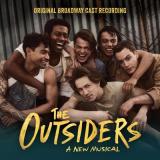Outsiders review
Outsiders Review - Broadway musical
If Broadway, under the same risk-averse pressures as Hollywood, has to keep rummaging through the library for more and more previous touchstones to adapt, it could do worse than The Outsiders. SE There's a reason why Hinton's iconic young adult novel has been a middle and high school English class staple for almost 50 years. Though its once-controversial content - violence, addiction, melancholy, realistic descriptions of socioeconomic struggle, and endless cigarettes - no longer feels risqué in 2024, the novel captured a certain ageless teenage angst. Hinton's book, written when she was 16 and published while she was a freshman in college, has long resonated with teenage readers who feel disenfranchised, shunned, doubted, or simply adrift in a whirlpool of emotions.An Enemy of the People review: Jeremy Strong impresses in this current Ibsen drama.
Read More.
The Broadway musical adaptation, with a book by Adam Rapp and Justin Levine, works hard to get into the vein of uncooked yearning and pent-up resentment, with a light touch of Americana sound and a major emphasis on small-town dreams. Everyone involved, including executive producer Angelina Jolie, appears to be committed to the legacy of the original (and Francis Ford Coppola's 1983 film), with a genuine desire to wring something new (and lyrical) out of these repressed teenagers and now-outdated slang. (Jolie allegedly became involved on the recommendation of her 15-year-old daughter Vivienne, who watched the musical in its premiere at the La Jolla Playhouse. The production is the perfect ideal of a retro classic remade for Broadway, broadly attractive to audiences of all ages (my showing was split between boomers and children), but not particularly burning, identifiable but not tremendously distinct, earnest and competent but not thunderous.
As in the novel, the show, directed by Danya Taymor (Pass Over), is narrated by Ponyboy Curtis (an appealing Brody Grant), a moony 14-year-old who fantasizes about leaving 1967 Tulsa and escapes his troubles through books and movies like Cool Hand Luke. Ponyboy expresses his unease in a sad, perfunctory ballad, the music and lyrics of which are by Levine and the Americana group Jamestown Revival, tinged with folk and a dash of pop-country. His parents were killed in a car accident; his oldest brother Darrel (Brent Comer) works long, menial hours to keep the family afloat (and has multiple songs to express his frustration, justice for oldest siblings!); and his handsome middle brother Sodapop (Jason Schmidt) is heartbroken and involved in the Greasers, a local gang of working-class kids led by a lone wolf out-of-towner named Dallas Winston (Joshua Boone).
The Greasers have a bitter rivalry with the affluent, cross-town "Socs" (as in "socials"), who are "building up the west side while the east side falls apart," as Grant sings, his voice rich and inviting, especially in the calmer parts. Brutal clique bitterness is an old story, and it is not made much clearer here: the Greasers and Socs despise each other, but Ponyboy connects with queen bee Cherry Valance (Emma Pittman) at an intra-gang drive-in over their mutual alienation; when their respective groups find out, horrible violence ensues, driving a reluctant Ponyboy and his beloved best friend Johnny Cade (Sky Lakota-Lynch) away from town.
Though a classic novel in its own right, the show's drive-in dance-off, petty gang rivalries, and rumbles pale in comparison to classic musicals like Grease and West Side Story, despite Taymor's attempts to distinguish it with more gritty, visceral takes on the violence. The moments from which you cannot recover - a concussion, a punch, a death - are depicted in near-strobe-lit slow motion, as glimpses and fragments rather than scenes. (The Outsiders also reminds us: is there any sound more foreboding than that of an approaching train?) The searing flashes of designer Brian MacDevitt's lights and the frenetic, exquisite fight choreography by the twins Rick and Jeff Kuperman demonstrate a more current awareness of how trauma rips memory and violence obliterates all it touches.
The Outsiders, with one eye on the past and the other on the present, finds a delicate balance on race, not entirely color-blind in its casting (the Coppola film is unmistakably white working class), but not preachy either. The shiftiness of Johnny Cade's restless, uneasy awareness (Lakota-Lynch is Native American) and Dallas's lament of being harassed wherever he goes allow the viewer to fill in the gaps. The same goes for the minimalist, industrial set of rafters, scaffolding, and wooden planks, as well as the projection skeletons - a drive-in movie theater, a billboard, and an abandoned church where Ponyboy and Johnny hide.
Hinton had a knack for melodrama; the extremes of adolescent passion can still be seen in the tale choices, even in a production as sleek and generic as this one. In musical form, The Outsiders is at times overly, excruciatingly sorrowful, at times strangely staid, and always feels obligated to something greater. It has the feel of a classic that has been updated for the modern era.
Last Update:June, 27th 2024
